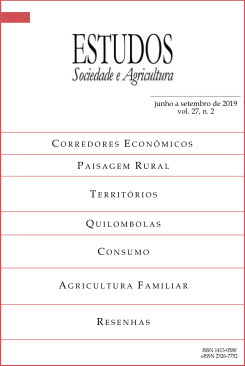Community that sustains agriculture: CSA of Belo Horizonte in the light of its possibilities and challenges
Comunidade que Sustenta a Agricultura: a CSA de Belo Horizonte à luz de suas possibilidades e desafios
DOI:
https://doi.org/10.36920/esa-v27n2-7Abstract
Recent years have seen the advance of alternative models of consumption, which seek to restore relations between consumers and producers, such as the Community that Supports Agriculture (CSA). Following this proposal, despite the rapid expansion in Brazil, there are still gaps in scientific works that explore its practices. In order to contribute with empirical elements for the CSA movement, the present article aimed to expose the performance of the Belo Horizonte experience, evidencing its achievements and challenges. In methodological terms, a case study was adopted, based on participant observation and semi-structured interviews with farmers and coproducers. The research results presented innovative organizational practices that illustrate the potential of supporting small farmers and their families in order to provide stability and alternative paths attuned to the reality of the countryside. However, among its limits, it is worth emphasizing that as the group has expanded, the proximity between farmer and co-producer has become more difficult, which poses to the group the challenge of changing the posture from one of traditional consumption and to emphasize greater involvement and participation of CSA as a community.
Keywords: CSA; Belo Horizonte; innovations; challenges.
OLIVEIRA, Fernanda Antunes de; PEREIRA, Rafael Diogo; CALBINO, Daniel. Comunidade que Sustenta a Agricultura: a CSA de Belo Horizonte à luz de suas possibilidades e desafios. Estudos Sociedade e Agricultura, v. 27, n. 2, p. 371-393, jun. 2019.
Submitted in april 2019.
Accepted in may 2019.
Downloads
Downloads
Published
Issue
Section
License
Authors who publish in this journal agree to the following terms:
a) Authors maintain the copyright and grant the journal the right of first publication, with the work simultaneously licensed under the Creative Commons Attribution License which allows the sharing of the work with acknowledgment of authorship and initial publication in this journal.
b) Authors are authorized to take additional contracts separately, for non-exclusive distribution of the version of the work published in this journal (eg publish in institutional repository or as a book chapter), with acknowledgment of authorship and initial publication in this journal.
c) Authors are allowed and encouraged to publish and distribute their work online (eg in institutional repositories or on their personal page) at any point before or during the editorial process, as this can generate productive changes, as well as increase the impact and citation of published work (See The Effect of Free Access).






